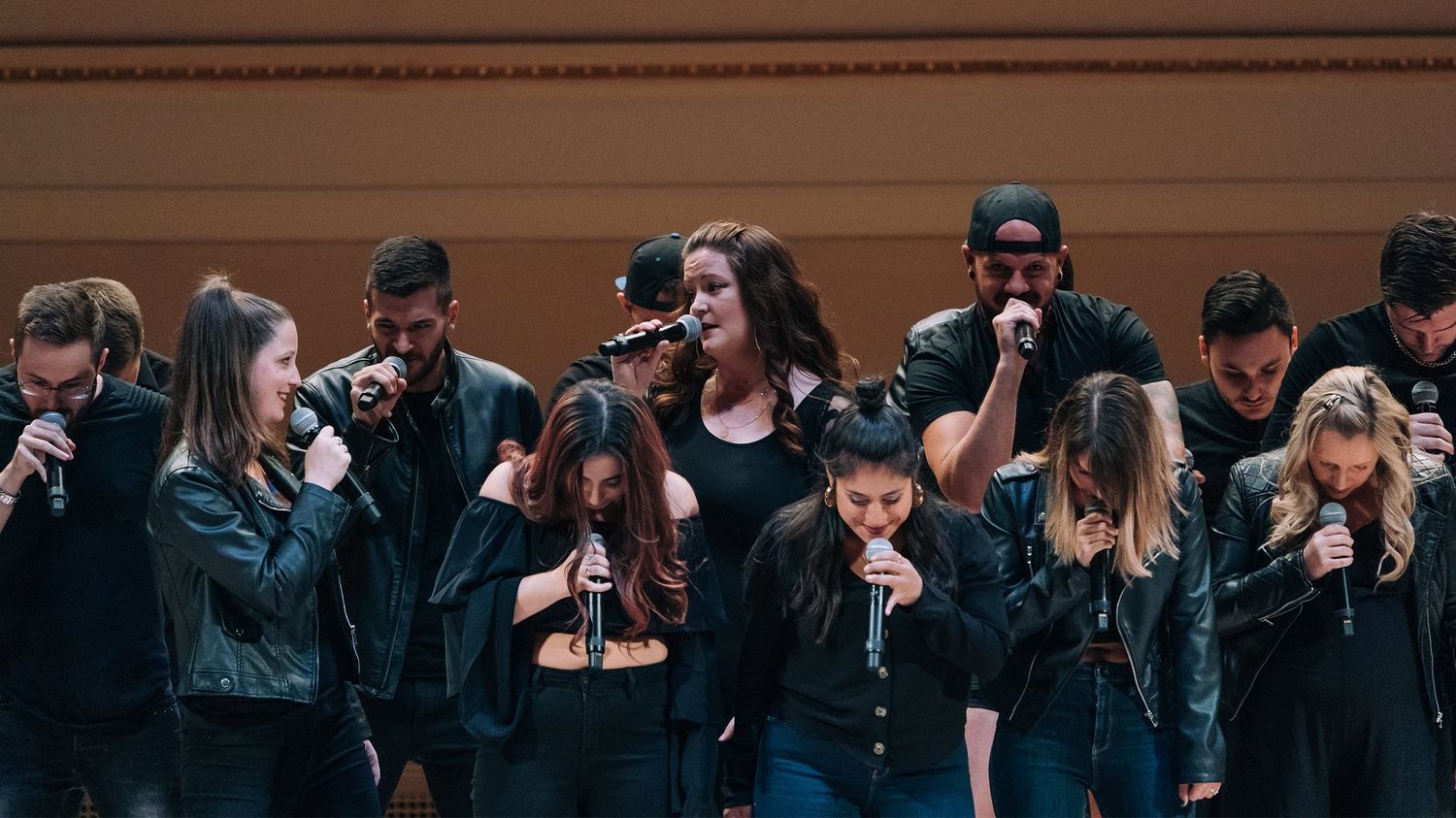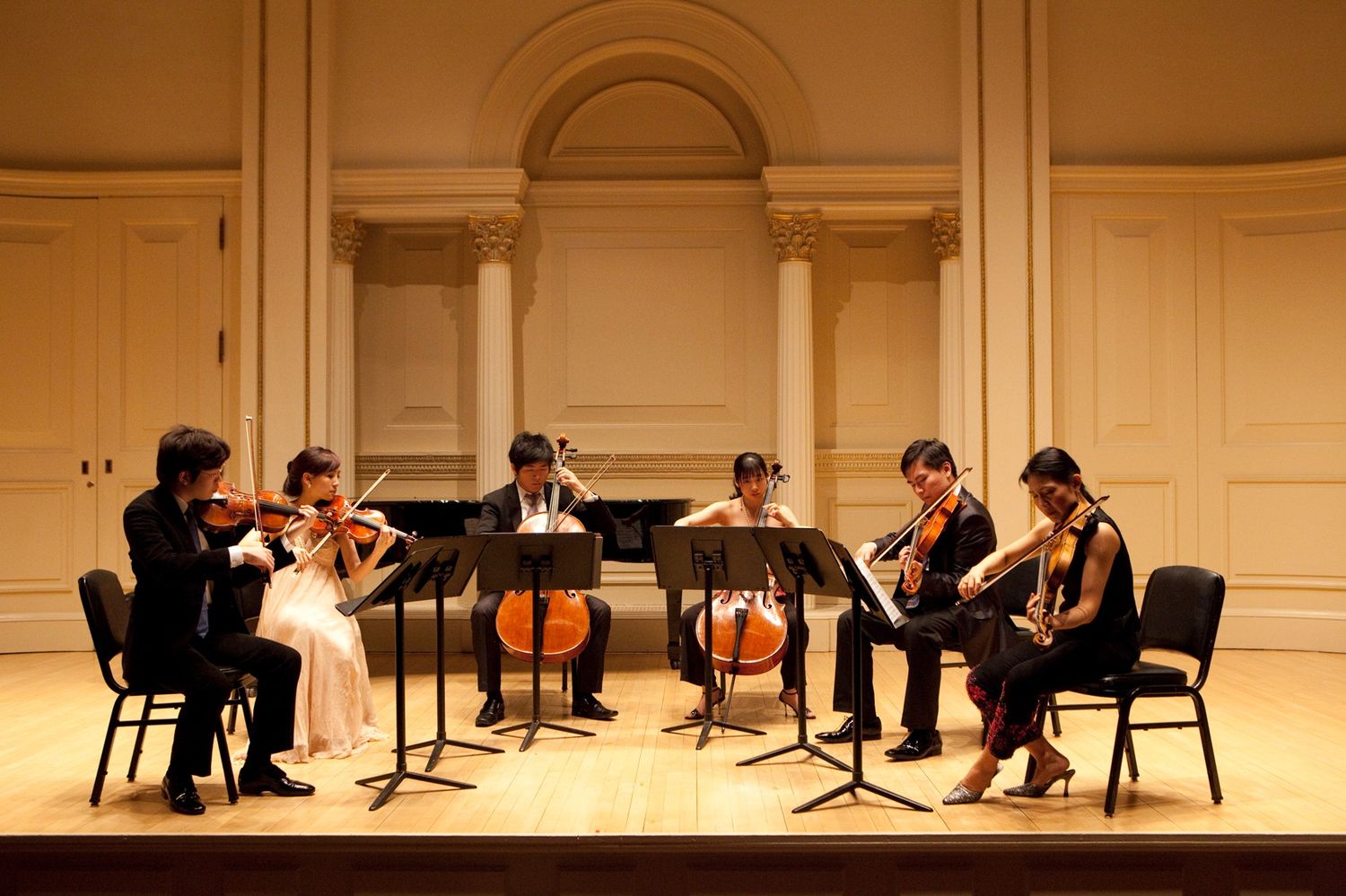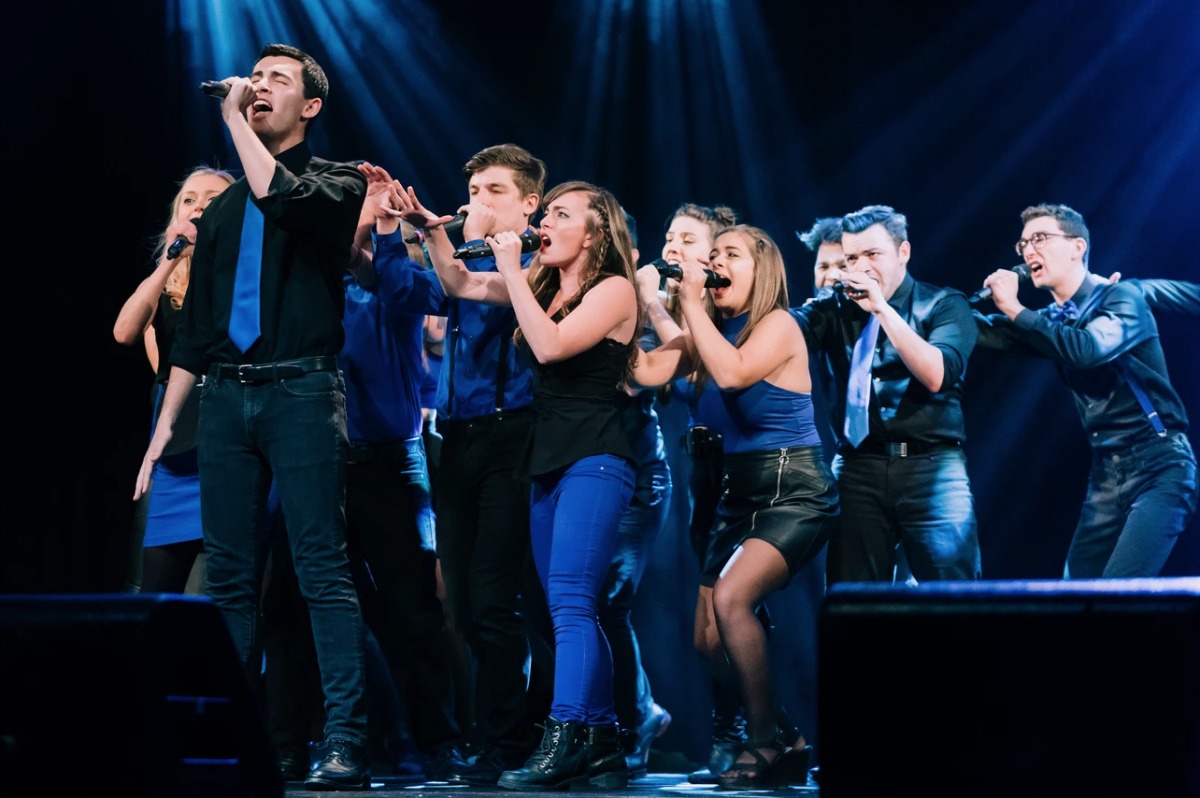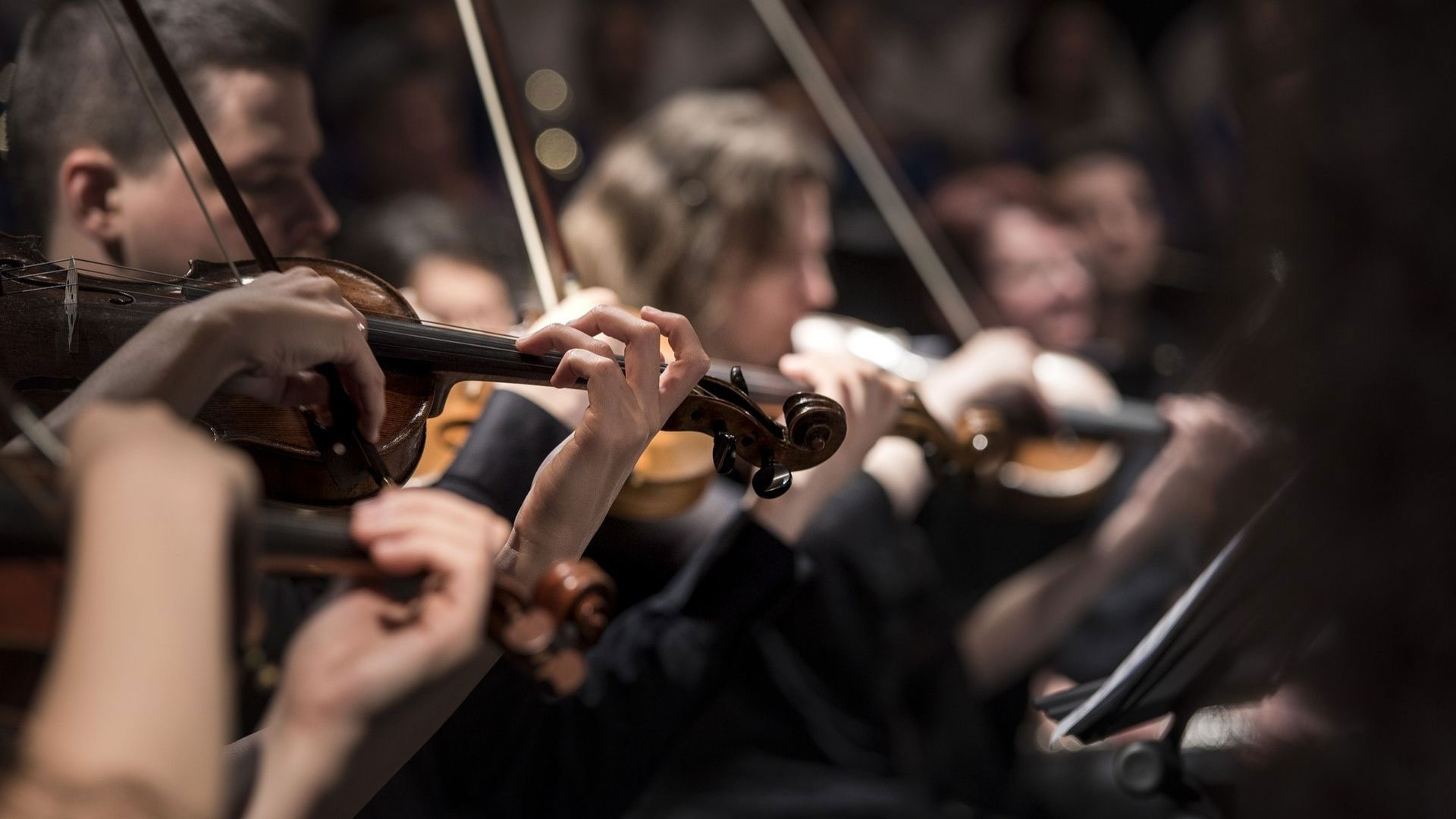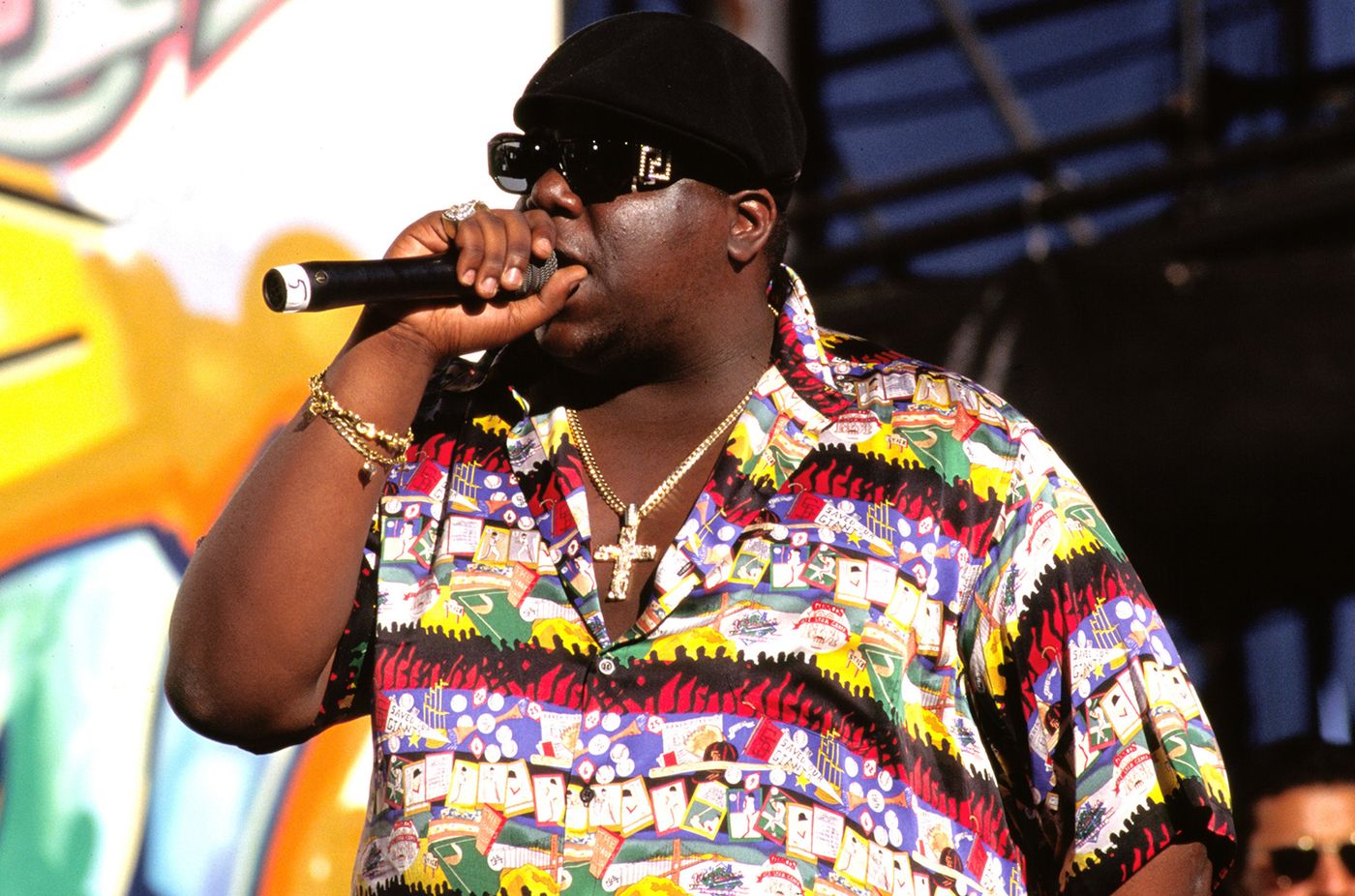Home>Events & Info>Acapella>What Is An Acapella Group


Acapella
What Is An Acapella Group
Published: January 3, 2024
Discover the captivating harmonies of an acapella group and learn what makes this unique style of music so mesmerizing. Explore the artistry and talent behind acapella performances.
(Many of the links in this article redirect to a specific reviewed product. Your purchase of these products through affiliate links helps to generate commission for AudioLover.com, at no extra cost. Learn more)
Table of Contents
Introduction
Acapella groups have gained significant popularity in recent years, captivating audiences with their impressive vocal harmonies and captivating performances. These musical ensembles, known for their stripped-down, purely vocal arrangements, showcase the immense artistic potential of the human voice. Whether it’s a group of friends singing together or a professional choir, acapella groups possess a unique ability to captivate listeners and create a powerful musical experience.
In this article, we will explore the world of acapella groups, from their definition and history to the characteristics that distinguish them. We will also delve into the vocal techniques used by acapella groups and discuss the different types of acapella ensembles that exist.
Furthermore, we will highlight some of the notable acapella groups that have left an indelible mark on the music industry. Additionally, we will examine the benefits of participating in an acapella group and address the challenges faced by these talented vocalists.
So, whether you’re an aspiring singer interested in joining an acapella group or simply curious about the fascinating realm of vocal harmony, this article will provide you with a comprehensive understanding of acapella groups and their profound impact on the world of music.
Definition of Acapella Group
An acapella group is a musical ensemble that performs without the accompaniment of musical instruments. Instead, the group relies solely on the human voice to create intricate harmonies and melodies. The term “acapella” is derived from the Italian phrase “a cappella,” which means “in the manner of the chapel.” This references the early origins of acapella singing, where religious choirs would perform vocal music in chapels without the accompaniment of instruments.
One of the defining features of an acapella group is their ability to recreate instrumental sounds using only their voices. Each member of the group typically specializes in a specific vocal range or part, such as soprano, alto, tenor, or bass. By combining their individual voices, acapella groups are able to produce a full and rich sound, creating the illusion of a complete instrumental ensemble.
Acapella groups can vary in size, ranging from small quartets to large choirs consisting of thirty or more members. They can also be comprised of individuals of various ages and backgrounds, from high school students to professional musicians.
It’s important to note that acapella groups are not limited to any specific genre of music. While many acapella groups perform contemporary pop songs, others explore classical, jazz, gospel, or even experimental genres. This versatility allows for a wide range of creative expression and musical exploration within the acapella community.
In recent years, acapella groups have gained significant mainstream recognition, thanks in part to television shows like “The Sing-Off” and the movie “Pitch Perfect.” These platforms have helped to popularize acapella music and shed light on the immense talent and creativity of vocal-only performances.
Overall, the definition of an acapella group encompasses any ensemble that showcases the power and beauty of the human voice by performing without the accompaniment of instruments. Through their harmonies, vocal techniques, and artistic interpretations, acapella groups captivate audiences and demonstrate the sheer limitless potential of the human voice.
Brief History
The origins of acapella singing can be traced back centuries, with mentions of vocal-only performances found in various cultures throughout history. However, the acapella groups we are familiar with today have their roots in the early Christian church and the Renaissance era.
In medieval times, the Catholic Church played a significant role in the development of acapella music. Choral singing became an integral part of religious services, and vocal ensembles would perform sacred chants and hymns without any instrumental accompaniment. This style of singing, known as plainchant or Gregorian chant, laid the groundwork for acapella music as we know it.
During the Renaissance period, acapella music gained prominence in both religious and secular settings. Composers like Josquin des Prez and Palestrina wrote intricate vocal compositions meant to be performed without instruments. These polyphonic works showcased the beauty and complexity of vocal harmony, setting the stage for the evolution of acapella music.
In the 20th century, acapella groups began to emerge in different musical genres. In African-American communities, barbershop quartets became popular, with their close harmonies and playful vocal arrangements. African-American spirituals and gospel music also heavily featured acapella singing, often in the context of community gatherings and church services. In addition, vocal jazz groups like The Mills Brothers and The Hi-Lo’s showcased their exceptional vocal talents in acapella performances.
In recent decades, the popularity of acapella groups has skyrocketed, thanks to the rise of vocal competitions and the accessibility of recording technology. The release of the album “The Battle of the Sexes” by the Swingle Singers in 1963 helped to popularize acapella music around the world, as it showcased the group’s inventive arrangements and vocal techniques.
Furthermore, with the advent of the internet, acapella groups have gained a global platform to share their music. YouTube, in particular, has become a thriving hub for acapella enthusiasts to upload their performances, gaining a wide audience and inspiring new generations of singers to explore the possibilities of vocal-only music.
Today, acapella groups continue to push the boundaries of vocal harmony, incorporating innovative techniques and arrangements into their performances. The rich history of acapella music has provided a strong foundation for contemporary ensembles to build upon, amplifying the beauty and versatility of the human voice.
Characteristics of Acapella Groups
Acapella groups exhibit several unique characteristics that set them apart from other types of musical ensembles. These characteristics contribute to the distinct sound and appeal of acapella music. Here are some of the key features that define acapella groups:
- Vocal Harmony: The primary focus of an acapella group is to create intricate vocal harmonies. Each member of the group sings their own individual part, blending together to form a cohesive and harmonious sound. This emphasis on vocal blending and harmony is what gives acapella music its distinctive and captivating quality.
- No Instrumental Accompaniment: Acapella groups perform without any backing instruments. They rely solely on their voices to create a full and rich musical texture. This absence of instrumental accompaniment highlights the raw and unadulterated power of the human voice and allows for a greater emphasis on vocal techniques and expression.
- Vocal Percussion: To compensate for the lack of instruments, many acapella groups incorporate vocal percussion into their performances. Vocal percussionists, often called “beatboxers,” recreate drum beats, rhythms, and other percussive sounds using only their mouths and vocal cords. This adds a dynamic and rhythmic element to the acapella sound.
- Arrangements and Vocal Techniques: Acapella groups are known for their unique arrangements of popular songs. These arrangements often involve complex vocal layering, improvisation, and creative reinterpretations of melodies and harmonies. Acapella singers also employ various vocal techniques, such as vocal runs, riffs, and vocal effects, to add depth and artistry to their performances.
- Interpretation and Expression: Like any musical ensemble, acapella groups bring their own interpretation and expression to the songs they perform. Through their vocal delivery, dynamics, and stage presence, acapella groups infuse emotion and storytelling into their music, creating a captivating and engaging performance for the audience.
In combination, these characteristics define the essence of acapella groups. They highlight the versatility and creativity of the human voice, allowing acapella groups to produce a wide range of musical genres and styles. Whether performing classical, jazz, pop, or gospel, acapella groups have the ability to captivate audiences and create an immersive and powerful musical experience.
Vocal Techniques Used in Acapella Groups
Acapella groups rely on a variety of vocal techniques to create their unique sound. These techniques enhance the richness and complexity of the vocal harmonies and allow for creative interpretations of songs. Here are some of the vocal techniques commonly used in acapella groups:
- Vocal Blending: One of the key elements of acapella singing is achieving a seamless vocal blend. Ensemble members work together to match their tone, timbre, and vowel placement, creating a unified sound that blends harmoniously.
- Vocal Dynamics: Acapella groups utilize vocal dynamics to add depth and emotion to their performances. They carefully control the volume and intensity of their voices, creating contrast between soft, intimate passages and powerful, vibrant moments.
- Layering and Stacking: Acapella groups often employ vocal layering techniques, where harmonies are built by adding different vocal parts on top of each other. This creates a rich and textured sound, enhancing the overall impact of the performance.
- Vocal Percussion: Vocal percussion, or beatboxing, is a popular technique in acapella music. Beatboxers use their mouths and vocal cords to create drum beats, rhythm patterns, and various percussive sounds, adding a dynamic and rhythmic element to the performance.
- Vocal Effects: Acapella singers utilize various vocal effects to enhance their performances. This may include imitating instrumental sounds, creating vocal harmonics, or employing techniques like vocal fry, falsetto, or vibrato to add texture and color to their singing.
- Vocal Runs and Riffs: Vocal runs and riffs are melodic embellishments that involve quick and agile movements between different pitches. Acapella singers often incorporate these embellishments to showcase their vocal agility and bring flair to their performances.
- Improvisation: In some acapella performances, singers engage in improvisation, spontaneously creating vocal melodies, harmonies, or rhythms. This allows for individual expression and showcases the versatility and musicality of the singers.
These vocal techniques, when combined with the unity and precision of the ensemble, contribute to the mesmerizing and captivating sound of acapella groups. By harnessing the expressive possibilities of the human voice, acapella singers create a vibrant and engaging musical experience that transcends traditional instruments.
Types of Acapella Groups
Acapella music encompasses a wide range of styles and genres, and as a result, there are various types of acapella groups that cater to different musical preferences. From traditional choirs to contemporary vocal bands, here are some of the common types of acapella groups:
- Choirs: Choirs are large acapella ensembles consisting of singers arranged in sections based on vocal range (soprano, alto, tenor, and bass). They typically perform classical, sacred, or choral repertoire, showcasing the power and beauty of acapella vocal harmony.
- Barbershop Quartets: Barbershop quartets are small groups of four singers, usually consisting of a lead, tenor, baritone, and bass. This type of acapella group specializes in close harmony arrangements of popular songs, emphasizing the unique style and techniques associated with barbershop music.
- Vocal Bands: Vocal bands are modern acapella groups that perform a wide range of genres, including pop, R&B, jazz, and rock. These groups often incorporate beatboxing and vocal percussion, creating a full-sounding and contemporary acapella experience.
- Collegiate Acapella Groups: Collegiate acapella groups are composed of students from colleges or universities. These groups focus on contemporary music, often arranging and performing current pop songs with their own acapella twist.
- Professional Acapella Ensembles: Professional acapella ensembles are full-time vocal groups that specialize in acapella performances. They collaborate with renowned musicians, create original arrangements, and tour globally, showcasing the highest level of vocal technique and artistry.
- Gospel Choirs: Gospel choirs are acapella groups known for their soulful and uplifting performances. They draw inspiration from African-American spirituals and gospel music, often featuring powerful vocal solos, call-and-response singing, and spirited improvisation.
- Community Acapella Groups: Community acapella groups are open to singers of all levels and backgrounds, with the focus on providing a space for people to share their love of singing acapella in a supportive and inclusive environment. These groups may perform at local events, festivals, or community gatherings.
Each type of acapella group has its own unique style, repertoire, and performance approach. They offer opportunities for singers to explore different genres, showcase their vocal talents, and connect with fellow musicians who share a passion for acapella music.
Whether you’re drawn to the traditional sounds of a choir, the modern energy of a vocal band, or the expressive artistry of a professional ensemble, the diverse types of acapella groups ensure that there’s something for everyone’s musical taste.
Notable Acapella Groups
The world of acapella music is filled with incredibly talented groups that have made a significant impact on the genre. These notable acapella groups have captivated audiences worldwide with their extraordinary vocal abilities, innovative arrangements, and stunning performances. Here are just a few of the many remarkable acapella groups:
- Pentatonix: Pentatonix, a five-member vocal band, rose to fame after winning the third season of “The Sing-Off.” Known for their impeccable harmonies, vocal percussion, and impressive vocal range, Pentatonix has reimagined popular songs with their unique acapella spin. They have released numerous albums, won multiple Grammy Awards, and amassed a massive online following with their viral YouTube videos.
- The Swingle Singers: Founded in 1962, The Swingle Singers were pioneers in establishing acapella music as a genre. They gained international recognition for their innovative jazz-infused vocal arrangements. With their tight harmonies and dynamic performances, The Swingle Singers have remained influential throughout the decades.
- Straight No Chaser: Straight No Chaser, a collegiate acapella group from Indiana University, gained prominence when their performance of “The 12 Days of Christmas” went viral on YouTube. Their soulful harmonies, engaging stage presence, and diverse repertoire have earned them a dedicated fan base and a successful recording career.
- VoicePlay: VoicePlay gained popularity through their appearances on “The Sing-Off.” This vocal quintet incorporates beatboxing, vocal effects, and theatrical elements into their performances. VoicePlay’s creative arrangements and powerful vocal performances have made them a standout group in the acapella community.
- Home Free: Home Free is a country acapella group known for their exceptional harmonies and deep vocal bass. The group gained fame by winning the fourth season of “The Sing-Off” and has since released multiple successful albums, blending country music with their signature acapella style.
- Naturally 7: Naturally 7 is a vocal band known for their ability to mimic the sounds of instruments using only their voices. Their tight harmonies, intricate vocal arrangements, and beatboxing skills have garnered international acclaim, and they have performed alongside renowned artists such as Michael Bublé and Coldplay.
These notable acapella groups have showcased the extraordinary capabilities of the human voice, pushing the boundaries of acapella music and inspiring countless singers and musicians around the world. Through their talent, dedication, and innovation, they have elevated acapella music to new heights and expanded its reach to broader audiences.
While these groups have made significant contributions to the acapella genre, it’s important to recognize that there are numerous other talented acapella groups, both established and emerging, who continue to shape and enrich the acapella music landscape.
Benefits of Participating in an Acapella Group
Joining an acapella group can be a rewarding and enriching experience for singers of all skill levels. Beyond the joy of making music together, participation in an acapella group offers a range of benefits that contribute to personal growth, musical development, and social connections. Here are some of the key benefits of being part of an acapella group:
- Musical Skill Development: Singing in an acapella group provides an opportunity to develop and refine various musical skills. Members improve their vocal technique, sight-reading abilities, and ear training while working on intricate harmonies and challenging vocal arrangements.
- Vocal Blend and Harmony: Acapella groups focus on achieving a seamless vocal blend and harmonies. By singing with others, members learn to match their tone, dynamics, and phrasing, enhancing their ability to blend their voices and create beautiful harmonies.
- Teamwork and Collaboration: Being part of an acapella group requires teamwork and collaboration. Members need to work together to achieve a unified sound and coordinate their vocal parts. This fosters important skills such as communication, compromise, and mutual respect.
- Performance Experience: Acapella groups offer regular performance opportunities, allowing members to showcase their talent and entertain audiences. Performing in front of others helps build confidence, stage presence, and the ability to connect with the audience on an emotional level.
- Musical Creativity: Acapella groups often have the freedom to create their own arrangements and interpretations of songs. This encourages members to explore their musical creativity, experiment with vocal techniques, and express their unique artistic voice.
- Friendship and Camaraderie: Joining an acapella group provides a sense of belonging and camaraderie. Singers form deep bonds with their fellow group members, creating a supportive and encouraging musical community where friendships flourish.
- Personal Growth: Participating in an acapella group fosters personal growth on multiple levels. Members develop self-discipline, perseverance, and resilience through the challenges of learning complex vocal arrangements. They also gain a deeper sense of musical appreciation and a greater understanding of teamwork and collaboration.
- Networking and Opportunities: Acapella groups often have opportunities to connect with other musicians, industry professionals, and potential collaborators. This can lead to networking opportunities, invitations to perform at events, and even chances to pursue career pathways in music.
- Stress Relief and Well-being: Singing with others in an acapella group can provide a healthy outlet for stress relief and emotional well-being. The act of singing releases endorphins, boosts mood, and creates a sense of joy and fulfillment.
Participating in an acapella group not only allows singers to develop their musical skills but also offers numerous personal, social, and emotional benefits. It is an experience that fosters growth, connections, and the sheer joy of creating beautiful music together.
Challenges Faced by Acapella Groups
While participating in an acapella group can be an incredibly rewarding and fulfilling experience, it also comes with its fair share of challenges. From technical hurdles to interpersonal dynamics, here are some of the obstacles that acapella groups may encounter:
- Complex Vocal Arrangements: Acapella groups often tackle complex vocal arrangements that require precision and meticulous attention to detail. Learning and mastering intricate harmonies, rhythms, and vocal techniques can be challenging and time-consuming.
- Vocal Technique and Maintenance: Maintaining vocal health and technique is crucial for acapella singers. Overuse or strain of the voice can lead to vocal fatigue and potential vocal injuries, requiring singers to be diligent in their vocal warm-ups, hydration, and vocal care regimens.
- Vocal Blend and Balance: Achieving a seamless vocal blend and balance within the group can be a continuous challenge. Members must constantly work on matching their vocal tone, dynamics, and vowel placement to maintain a cohesive sound, particularly when blending different voice types.
- Timing and Rhythm: Timing and rhythm are essential in acapella performances, especially when there is no instrumental accompaniment. Ensuring that every singer maintains a precise sense of timing, executes complex rhythmic patterns, and syncs their vocals with other group members can be demanding.
- Interpersonal Dynamics: A strong acapella group requires effective communication and positive interpersonal dynamics. Conflicts or differences in opinions among group members can arise, challenging the harmony and cohesiveness of the ensemble. Resolving these issues requires open dialogue, compromise, and a shared commitment to the group’s goals.
- Performance Nerves and Pressure: Performing in front of an audience can evoke performance nerves and pressure. The responsibility of delivering a captivating and flawless performance places additional stress on group members, requiring them to develop strategies to manage performance anxiety and maintain focus on stage.
- Rehearsal Commitment: Meeting the demands of regular rehearsals can be challenging, especially for groups with members who have busy schedules or conflicting commitments. Balancing personal, professional, and academic responsibilities alongside dedicated rehearsal time can be a juggling act for group members.
- Creating Unique and Original Arrangements: Many acapella groups strive to create their own unique arrangements of songs. Transforming popular songs into acapella arrangements that stand out and capture the essence of the original while adding a fresh twist demands creativity and musical expertise.
- Competition and Standing Out: In a competitive acapella landscape, standing out can be a challenge. Groups must find ways to differentiate themselves, develop a distinct identity, and continually innovate in their performances to captivate audiences and judges.
Despite these challenges, dedicated acapella groups are able to overcome obstacles through perseverance, collaboration, and a shared love for music. By facing these challenges head-on, acapella groups grow artistically, strengthen their bonds, and emerge as resilient and exceptional performers.
Conclusion
Acapella groups offer a unique and captivating musical experience, showcasing the sheer power and beauty of the human voice. From their humble origins in religious chants to the innovative vocal arrangements of contemporary ensembles, acapella music has evolved and thrived throughout history.
In this article, we have explored the definition of an acapella group, delved into its fascinating history, and examined the characteristics and vocal techniques that make acapella music so distinct. We have also discussed the different types of acapella groups, highlighting notable ensembles that have left their mark on the genre.
Participating in an acapella group offers a range of benefits, including musical skill development, teamwork, and personal growth. However, it also comes with its fair share of challenges, such as complex vocal arrangements, interpersonal dynamics, and the pressure to deliver flawless performances.
Despite these challenges, the world of acapella music continues to thrive, thanks to the incredible talent, dedication, and creativity of acapella groups across the globe. Through their harmonies, arrangements, and performances, acapella groups captivate audiences, inspire future generations of singers, and push the boundaries of vocal music.
Whether you are an aspiring singer looking to join an acapella group or simply a fan of acapella music, we hope this article has provided you with a comprehensive understanding of this remarkable art form. So, let the voices soar, harmonies blend, and creativity flow as we continue to celebrate the awe-inspiring acapella tradition.


